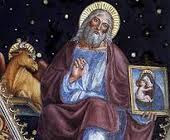Tuesday, October 18, 2011 - Luke, Evangelist
Why this picture? Did you know that some historians believe that Luke besides being a physician was also an artist? Perhaps this artistic skill, if indeed true, my also reflect with his seemingly personal approach to others. No other gospel writer writes so well about the birth of Jesus; his account of the Prodigal Son allows him to share something of his heart with us; his stopping along the way to Calvary to speak to the women of Jerusalem and others. He presents a compassionate Jesus throughout his gospels. He does not overlook women in his writing. His history is consummate accuracy according to scholars. In addition to this characteristics of his personality, Luke knew he was on a mission both in his gospel as well as in the Acts of the Apostles, attributed to him. In his writings he is seeking to proclaim to the world that Jesus is the Word of God. Luke was also, it seems, from the letters of St. Paul, one of the apostles who was close to the Damascus man. In Paul's letter to the Colossians (4:11), the reader can detect reasons for the position that Luke himself was not a Jewish man. A man from Greece, the town of Antioch, he would not have been circumcised as were many of those associated with Paul and thus not a Jew but, rather, a Gentile. Therefore, (surprise, surprise!!) Luke most likely was the only non-Jewish writer in the New Testament.
From the gospel, we hear again Jesus' reminder that there is a large harvest awaiting the apostles who would go forth among the peoples. At the same time, in Luke's words we read of Jesus' warnings to his disciples that those who go forth to preach the Word, to evangelize the communities: trouble most like awaits the preachers ... like sheep among wolves. Now, isn't this the same message that Jesus might preach if he were in many parts of the world today? Luke learned from his trips with Paul, that the field was filled with those seeking answers to questions. Is it any different today?
We speak about the potential great harvests often. But there is this question: are you taking the time to prepare yourself for work in the various "vineyards" that exists. This means that proclaimed followers of Jesus Christ, whether Bishop, priest or lay man or woman, must take time to learn and refresh earlier learning. Pope Benedict announced that he is setting aside next year beginning with the 50 anniversary of the Second Vatican Council as a Holy Year. Now is the time for us to learn anew and to refresh our understanding of the faith as we prepare for the Holy Year, a special time of grace, prayer and learning for all who say "Yes, I am a Catholic!"
